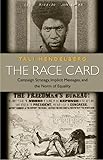The Race Card : Campaign Strategy, Implicit Messages, and the Norm of Equality / Tali Mendelberg.
Material type: TextPublisher: Princeton, NJ : Princeton University Press, [2017]Copyright date: ©2001Description: 1 online resource (328 p.) : 17 line illus., 16 tablesContent type:
TextPublisher: Princeton, NJ : Princeton University Press, [2017]Copyright date: ©2001Description: 1 online resource (328 p.) : 17 line illus., 16 tablesContent type: - 9780691070704
- 9781400889181
- 324.973/0089/96073 21
- E183
- online - DeGruyter
- Issued also in print.
| Item type | Current library | Call number | URL | Status | Notes | Barcode | |
|---|---|---|---|---|---|---|---|
 eBook
eBook
|
Biblioteca "Angelicum" Pont. Univ. S.Tommaso d'Aquino Nuvola online | online - DeGruyter (Browse shelf(Opens below)) | Online access | Not for loan (Accesso limitato) | Accesso per gli utenti autorizzati / Access for authorized users | (dgr)9781400889181 |
Browsing Biblioteca "Angelicum" Pont. Univ. S.Tommaso d'Aquino shelves, Shelving location: Nuvola online Close shelf browser (Hides shelf browser)

|

|

|

|

|

|

|
||
| online - DeGruyter In Search of the Phoenicians / | online - DeGruyter Economics for the Common Good / | online - DeGruyter Standing Soldiers, Kneeling Slaves : Race, War, and Monument in Nineteenth-Century America / | online - DeGruyter The Race Card : Campaign Strategy, Implicit Messages, and the Norm of Equality / | online - DeGruyter Hasidism : A New History / | online - DeGruyter Continuous-Time Models in Corporate Finance, Banking, and Insurance : A User's Guide / | online - DeGruyter In Search of Israel : The History of an Idea / |
Frontmatter -- Contents -- Illustrations -- Tables -- Preface -- PART ONE: THE ORIGIN OF IMPLICIT RACIAL APPEALS -- Chapter 1. A Theory of Racial Appeals -- Chapter 2. The Norm of Racial Inequality, Electoral Strategy, and Explicit Appeals -- Chapter 3. The Norm of Racial Equality, Electoral Strategy, and Implicit Appeals -- PART TWO: THE IMPACT OF IMPLICIT RACIAL APPEALS -- Chapter 4. The Political Psychology of Implicit Communication -- Chapter 5. Crafting, Conveying, and Challenging Implicit Racial Appeals: CampaignStrategy and News Coverage -- Chapter 6. The Impact of Implicit Messages -- Chapter 7. Implicit, Explicit, and Counter-Stereotypical Messages: The Welfare Experiment -- Chapter 8. Psychological Mechanisms: The Norms Experiment -- PART THREE: IMPLICATIONS OF IMPLICIT RACIAL APPEALS -- Chapter 9. Implicit Communication beyond Race: Gender, Sexual Orientation, and Ethnicity -- Chapter 10. Political Communication and Equality -- References -- Index
restricted access online access with authorization star
http://purl.org/coar/access_right/c_16ec
Did George Bush's use of the Willie Horton story during the1988 presidential campaign communicate most effectively when no one noticed its racial meaning? Do politicians routinely evoke racial stereotypes, fears, and resentments without voters' awareness? This controversial, rigorously researched book argues that they do. Tali Mendelberg examines how and when politicians play the race card and then manage to plausibly deny doing so. In the age of equality, politicians cannot prime race with impunity due to a norm of racial equality that prohibits racist speech. Yet incentives to appeal to white voters remain strong. As a result, politicians often resort to more subtle uses of race to win elections. Mendelberg documents the development of this implicit communication across time and measures its impact on society. Drawing on a wide variety of research--including simulated television news experiments, national surveys, a comprehensive content analysis of campaign coverage, and historical inquiry--she analyzes the causes, dynamics, and consequences of racially loaded political communication. She also identifies similarities and differences among communication about race, gender, and sexual orientation in the United States and between communication about race in the United States and ethnicity in Europe, thereby contributing to a more general theory of politics. Mendelberg's conclusion is that politicians--including many current state governors--continue to play the race card, using terms like "welfare" and "crime" to manipulate white voters' sentiments without overtly violating egalitarian norms. But she offers some good news: implicitly racial messages lose their appeal, even among their target audience, when their content is exposed.
Issued also in print.
Mode of access: Internet via World Wide Web.
In English.
Description based on online resource; title from PDF title page (publisher's Web site, viewed 30. Aug 2021)


